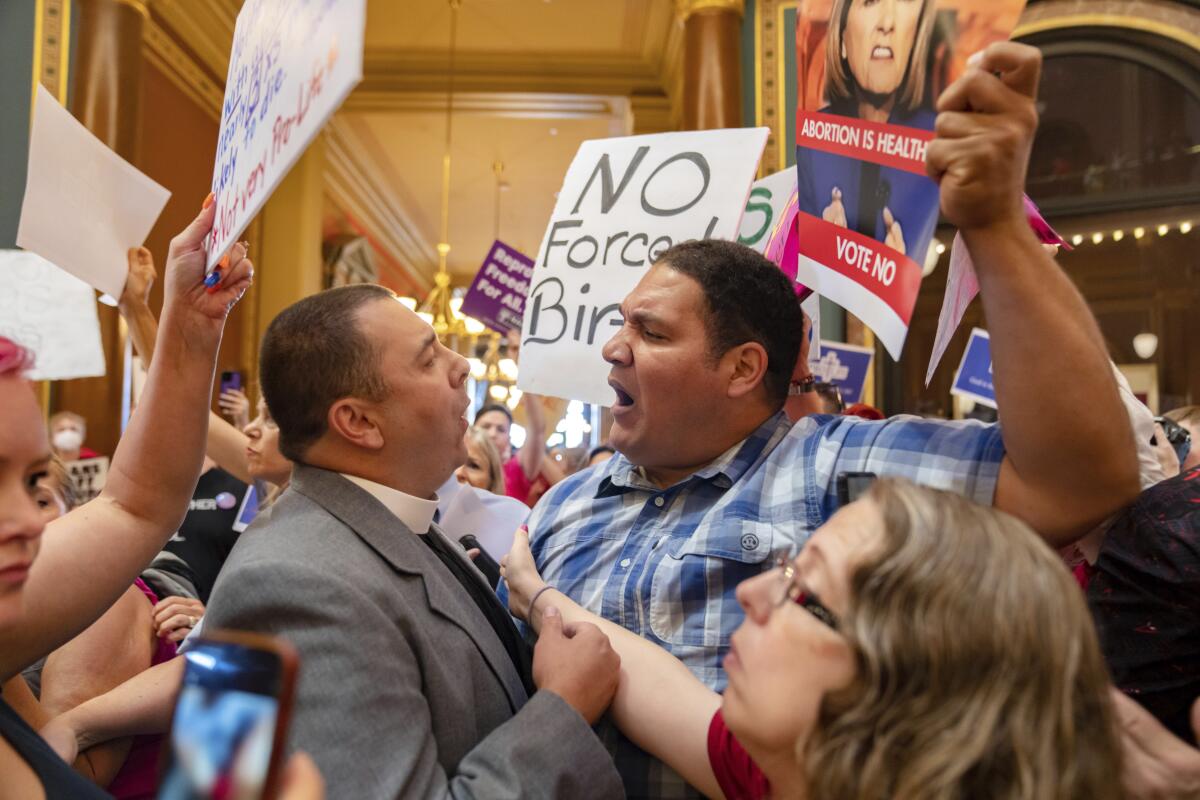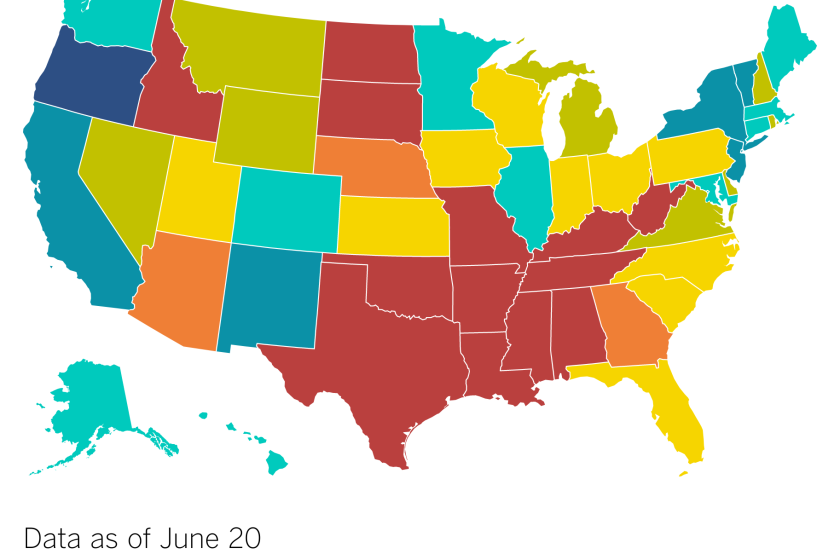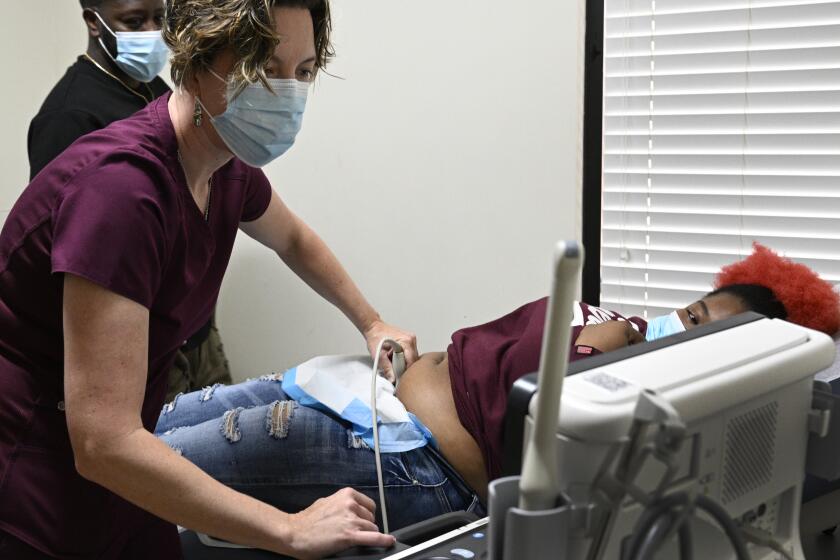Iowa Republicans pass bill banning most abortions after about 6 weeks, governor to sign on Friday

- Share via
DES MOINES, Iowa — Iowa’s Republican-led Legislature passed a bill banning most abortions after roughly six weeks of pregnancy during a marathon special session Tuesday that continued late into the night. Gov. Kim Reynolds immediately said in a statement she would sign the bill on Friday.
The bill passed with exclusively Republican support in a rare, one-day legislative burst lasting more than 14 hours over the vocal — and sometimes tense — objections from Democratic lawmakers and abortion-rights advocates protesting at the Capitol.
Just after 11 p.m., lingering protesters in the gallery booed and yelled “shame” to state senators in the minutes after the bill was approved.
Reynolds ordered the rare session after the state Supreme Court declined in June to reinstate a practically identical law that she signed in 2018.
“The Iowa Supreme Court questioned whether this legislature would pass the same law they did in 2018, and today they have a clear answer,” Reynolds said in a statement. “The voices of Iowans and their democratically elected representatives cannot be ignored any longer, and justice for the unborn should not be delayed.”
A year after the Supreme Court overturned Roe vs. Wade, leaving abortion decisions to states, where is abortion banned or protected? What comes next?
Abortion is currently legal in Iowa up to 20 weeks of pregnancy. The legislation will take immediate effect with the governor’s signature on Friday. It will prohibit almost all abortions once cardiac activity can be detected, which is usually around six weeks of pregnancy and before many women know they are pregnant.
Preparations were already underway to quickly file legal challenges in court and get the measure blocked, once Reynolds signs it into law.
“The ACLU of Iowa, Planned Parenthood, and the Emma Goldman Clinic remain committed to protecting the reproductive rights of Iowans to control their bodies and their lives, their health, and their safety —including filing a lawsuit to block this reckless, cruel law,” ACLU of Iowa Executive Director Mark Stringer said in a statement.
In the meantime, Planned Parenthood North Central States has said they will refer patients out of state if they’re scheduled for abortions in the next few weeks. The organization, the largest abortion provider in the state, will continue to provide care to patients who present before cardiac activity is detected.
A former abortion clinic in Alabama evolves amid bans on caring for uninsured patients and offering post-miscarriage treatment and transgender care.
There are limited circumstances under the measure that would allow for abortion after that point in a pregnancy where cardiac activity is detected — such as rape, if reported to law enforcement or a health provider within 45 days; incest, if reported within 145 days; if the fetus has a fetal abnormality “incompatible with life;” and if the pregnancy is endangering the life of the pregnant woman.
For much of the morning and afternoon, chants from abortion-rights advocates echoed through the rotunda and could be heard from rooms where state representatives and senators were meeting in the morning and afternoon. Members of the public for and against the bill alternated conveying their viewpoints to lawmakers from both chambers for nearly four hours in total.
Sara Eide of the Iowa Catholic Conference encouraged lawmakers to vote in favor.
“The unborn child is a distinct human life with her own value, with her own DNA, and with her own right to life and right to legal protections,” she said. “As a state and as a society, we should commit ourselves to protect all vulnerable populations wherever we find them.”
Hilary McAdoo, a fertility nurse, said her two daughters motivated her to voice her opposition Tuesday.
Abortion pill ruling: A federal judge in Texas halts FDA’s approval of mifepristone, an abortion medication. But another judge contradicts the ruling.
“Just because a person has the ability to become pregnant does not mean they should be forced to become a mother,” she said. “The people before me want to govern women’s bodies without understanding how they work.”
McAdoo called the six-week cutoff “impossible and irresponsible.”
Laws such as Iowa’s ban abortion when a “fetal heartbeat” can be detected, a concept that does not easily translate to medical science. That’s because at the point where advanced technology can detect that first visual flutter, the embryo isn’t yet a fetus, and it doesn’t have a heart. An embryo is termed a fetus beginning in the 11th week of pregnancy, medical experts say.
A district court found the 2018 law unconstitutional in 2019 based on rulings by the U.S. Supreme Court and Iowa’s Supreme Court that had affirmed a woman’s fundamental constitutional right to abortion.
After both bodies overturned those rulings last year, the governor sought to reinstate the 2018 law. But the state’s high court deadlocked last month without ruling on the merits of an abortion ban, leaving the law permanently blocked.
And so Reynolds called lawmakers back to Des Moines.
Democratic lawmakers proposed amendments to the language to expand the exceptions, which were swiftly rejected.
“Iowa women are less free than they were a week ago and it’s because of the work of Republicans in the legislature and the governor,” said House Minority Leader Jennifer Konfrst, who voiced concern that there will be instant chaos and confusion if and when the bill is signed into law.
“We will spend every day between now and election day letting voters know that the Republican Legislature was too extreme, went too far and voted against the interests of everyday Iowans,” she added.
Most Republican-led states have drastically limited abortion access in the year since the U.S. Supreme Court overturned Roe vs. Wade and handed authority on abortion law to the states. More than a dozen states have bans with limited exceptions and one state, Georgia, bans abortion after cardiac activity is detected. Several other states have similar restrictions that are on hold pending court rulings.
More to Read
Sign up for Essential California
The most important California stories and recommendations in your inbox every morning.
You may occasionally receive promotional content from the Los Angeles Times.












